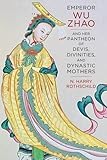Emperor Wu Zhao and Her Pantheon of Devis, Divinities, and Dynastic Mothers /N. Harry Rothschild.
Material type: TextSeries: Publication details: New York : Columbia University Press, (c)2015.Description: 1 online resource (382 pages)Content type:
TextSeries: Publication details: New York : Columbia University Press, (c)2015.Description: 1 online resource (382 pages)Content type: - text
- computer
- online resource
- 9780231539180
- Wu hou, Empress of China, 624-705
- Religion and politics -- China -- History
- Goddesses, Chinese -- History
- Ancestor worship -- China -- History
- Buddhism and state -- China -- History
- Ancestor worship -- China -- History
- Buddhism and state -- China -- History
- Goddesses, Chinese -- History
- Religion and politics -- China -- History
- Wu hou, Empress of China, 624-705
- BL1803 .E474 2015
- COPYRIGHT NOT covered - Click this link to request copyright permission: https://lib.ciu.edu/copyright-request-form
| Item type | Current library | Collection | Call number | URL | Status | Date due | Barcode | |
|---|---|---|---|---|---|---|---|---|
 Online Book (LOGIN USING YOUR MY CIU LOGIN AND PASSWORD)
Online Book (LOGIN USING YOUR MY CIU LOGIN AND PASSWORD)
|
G. Allen Fleece Library ONLINE | Non-fiction | BL1803 (Browse shelf(Opens below)) | Link to resource | Available | ocn908091733 |
Includes bibliographies and index.
Introduction: Wu Zhao and her pantheon of female political ancestors -- Part I. The goddesses of antiquity -- Wu Zhao as the late seventh-century avatar of primordial goddess Nüwa -- Sanctifying Luoyang: the Luo River goddess and Wu Zhao -- First ladies of sericulture: Wu Zhao and Leizu -- Part II. Dynastic mothers, exemplary mothers -- The mother of Qi and Wu Zhao: connecting to antiquity, elevating Mount Song -- Ur-mothers birthing the Zhou line: Jiang Yuan and Wu Zhao -- Wenmu and Wu Zhao: two mothers of Zhou -- Four exemplary women in Wu Zhao's regulations for ministers -- Part III. Drawing the numinous energies of female Daoist divinities -- The Queen Mother of the West and Wu Zhao -- The mother of Laozi and Wu Zhao: from one grand dowager to another -- Rejected from the pantheon: the ill-timed rise of the cult of Wei Huacun -- Part IV. Buddhist devis and goddesses -- Dharma echoes of Mother My in Wu Zhao -- Channeling pure radiance: Wu Zhao and Devi Jingguang -- Conclusions -- Appendix: Wu Zhao's pantheon of female political ancestors.
Wu Zhao (624--705), better known as Wu Zetian or Empress Wu, is the only woman to have ruled China over the course of its 5,000-year history. How did she rise to power, and why was she never overthrown? Exploring a mystery that has confounded scholars for centuries, this multifaceted history suggests that Wu Zhao drew on China's rich pantheon of female divinities and eminent women to aid in her reign. Wu Zhao could not obtain political authority through conventional channels, but she could afford to ignore norms and tradition. Deploying language, symbol, and ideology, she harnessed the cultural resonance, maternal force, divine energy, and historical weight of Buddhist devis, Confucian exemplars, Daoist immortals, and mythic goddesses, establishing legitimacy within and beyond the confines of Confucian ideology. Tapping into deep, powerful subterranean reservoirs of female power, Wu Zhao built a pantheon of female divinities carefully calibrated to meet her needs at court. Her pageant was promoted in scripted rhetoric, reinforced through poetry, celebrated in theatrical productions, and inscribed on steles. Rendered with deft political acumen and aesthetic flair, these affiliations significantly enhanced Wu Zhao's authority and cast her as the human vessel through which the pantheon's divine energy flowed. Her strategy is a model of political brilliance and proof that medieval Chinese women enjoyed a more complex social status than previously known.
COPYRIGHT NOT covered - Click this link to request copyright permission:
There are no comments on this title.
